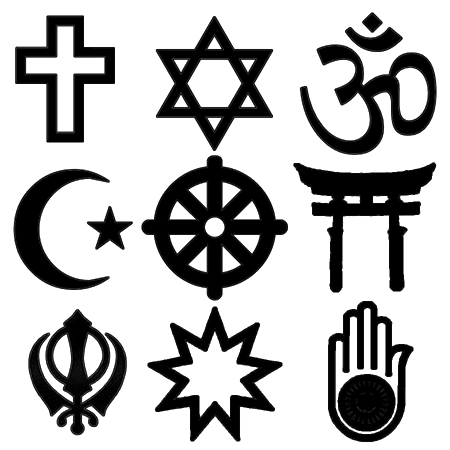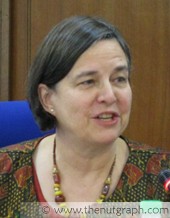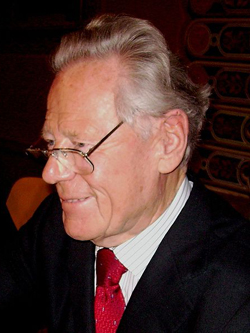
PETALING JAYA, 12 Aug 2010: There is no one method for successful interfaith engagement, an expert in global interfaith initiatives said.
World Faiths Development Dialogue executive director Katherine Marshall said engagement takes place on many different levels in many different ways. This ranges from the very specific, such as people of different faiths building a house together, to the very general, like dealing with global poverty or female feticide.
Marshall was speaking at a 9 Aug 2010 public lecture organised by the International Institute for Advanced Islamic Studies (IAIS).
Theological and practical
She said interfaith engagement has also happened through theological discussions focusing on common values between faiths, or through more practical initiatives that address common issues.
Marshall cited A Common Word and Building Bridges, efforts by Muslim and Christian leaders to discuss the common ground between the two religions, as examples of important theological engagements.
As for practical engagement over common issues, Marshall cited Ghana, where religious leaders came together to deal with the country’s poor sanitation. Muslim, Christian, Bahai’ and traditional religious leaders started an interfaith initiative against garbage, calling it their “crusade against filth”.
“Religious leaders worked together on clean-up campaigns. [As a result], when there was some tension during the elections, they already knew each other and could work together to head off potential conflict,” said Marshall, who worked with the World Bank for over 30 years on international development.
Marshall also spoke of interfaith collaboration to end malaria in Nigeria, one of the top countries for malaria deaths. Thousands of Nigerian imam, pastors and priests were trained to deliver sermons to their respective religious groups, in support of the campaign.
Marshall also gave the example of Habitat for Humanity, which brings people of all backgrounds, races and religions together to build houses for the homeless around the world.
Creative engagement

Marshall, who is senior fellow at Georgetown University’s Berkeley Center for Religion, Peace and World Affairs, acknowledged the difficulties in interfaith engagement, especially when one party is unwilling to dialogue.
“It is important to make engagement meaningful,” she said. “We need to bring evidence, to be clever about engagement, and to have skill in framing the questions.”
Marshall gave an example of a dialogue organised at the request of US evangelical Christians who were concerned about climate change. “The US evangelicals wanted to engage with Moroccan Muslims on climate change. It was a rich and interesting discussion on a problem faced by everyone.”
Marshall said the interfaith discussion took place despite ongoing tensions in Morocco over proselytisation to Muslims.
“But how can interfaith dialogue happen when bombs are flying and people have been killed?” asked an audience member.
Marshall said there were two schools of thought on this. “In any dialogue between Muslims and non-Muslims, the issue of Palestine and the Middle East usually comes up within five minutes. There are those who want to concentrate all efforts to solve that problem first before we work on anything else. And then there are those who want to work at many levels.”
Marshall said she subscribed to the idea of working on many different levels, and quoted US President Franklin Roosevelt who said during the Great Depression: “When in a crisis, pull any lever.”
“But how does one initiate dialogue in a crisis, especially when there is violence taking place? Is it just a luxury for stable countries?” Marshall was asked.
While acknowledging that certain interfaith activities would be difficult to carry out amidst violence, Marshall said there were still ways interfaith engagement could take place.
“The basic questions involved are things we need to reflect on all the time – why we are here, how we are different, how we are the same, what kind of world we want to leave our children,” answered Marshall.
Knowledge the key
Marshall said knowledge was key in reshaping people’s views about people of other faiths.

“Ignorance and fear is the tinder for conflict,” she said. “A lack of knowledge shapes attitudes. Studies have shown that even a simple understanding can reshape views.”
But no matter how interfaith engagement is carried out, what is certain is that human security and development cannot happen without it, she noted.
Marshall shared a quote from Hans Küng, a theologian and Global Ethic Foundation president, who said: “There will be no peace among the nations without peace among the religions. There will be no peace among the religions without dialogue among the religions.” ![]()
The Nut Graph needs your support


Dr Syed Alwi says
Dear TNG,
Singapore has been conducting all sorts of interfaith dialogues but to no effect. What can interfaith dialogue do ? You cannot insist that the Muslim community modify Islamic teachings. You cannot interfere in Islamic affairs. I have seen dozens of interfaith dialogues – all leading to nothing. At the end of the day – to you be your religion and to me mine.
We Muslims have our own practices and so do others. What matters is you do NOT interefere or impose your views on Islamic matters.
2nd class says
The non-Muslims have no intention of interfering with the Muslim especially the Malay Muslims, but when the Malay Muslims are trying to impose their Muslims practices on to the non-Muslims, that creates problems.
For example in the ‘Allah’ issue, the non-Muslims never create the problem for Muslims. They never try to covert the Muslims into Christians but because some of the politician trying to be hero in the name of Islam, the non-Muslim’s rights have to be sacrificed despite the use of ‘Allah’ for hundreds of years prior to this, even before the existence of Islam.
Also among the Muslim converts, many are not truthful, many convert because of the personal agenda. Once converted, Islam appeared to be ‘not fair’ to the non-Muslim. Kids automatically belong to the Muslim spouse, the non-Muslim has no right to the children in what so ever responsibility especially in deciding the religion of the children. Not to mention also the Muslim spouse tries to escape the responsibility of taking care of his spouse just because his spouse is not Muslim anymore.
The non-Muslim has no intention of interfering at all. In fact they are usually trying to stay away as far as possible except when even the basic rights of non-Muslims are being deprived.
Kong Kek Kuat says
Oh Syed Alwi,
Please tell us how you know that Singapore interfaith dialogue has not produced any effect.
2nd class says
There is no way the interfaith engagement can happen in Malaysia as long as the authority thinks that Islam is always a level above all the other religion and Islam is always right whenever there is any conflict and no compromise should be allowed to other religion in the name of defending the Islam.
When religions cannot talk on the same level, there will be no interfaith engagement as Islam is always having veto power in this country.
Radix says
Dear TNG
Thanks for this piece on Katherine Marshall’s talk. It is indeed a profound truth that in this age where every society consists of people of different faiths living in close quarters, human security will not be possible without interfaith engagement.
For certain, most people go into dialogues with no intention of having other’s beliefs imposed on them (as emphasised by Syed Alwi here). But even if dialogue does not change one’s belief, it invariably leads to a better understanding of others’ beliefs. That itself changes attitudes and is therefore well worth pursuing.
Similar to the Ghana story, a group of us who connected via a common cause (speaking out against the Gaza seige) were later able to mobilise quickly in a show of solidarity when the Church & Surau attacks occured. As yet no one has converted as a result of working together, but the friendships forged has certainly brought us one step closer to realising the 1Malaysia dream.
Eugene says
Dear Dr Syed Ali,
You asked, “What can interfaith dialogue do ?”. What answers were you expecting? There are many issues aside from religion that have been debated about, but probably none has ever been resolved. “So why bother ?”, you might ask. Well, I personally think that sometimes just debating and exchanging of ideas and thought is something healthy, it keeps both parties on their toes. There might not be an ultimate solution, but at the end of the day, those involved in these discussions can either choose to reflect on the outcome and attempt to make a difference or just plainly ignore what has been said and just have an attitude of ‘Business As Usual’, now that’s a waste of time and resources.
And your remark about others not interfering or imposing on Islamic matters, have you ever thought that probably those people are just trying to understand your faith better and probably its something that you could attempt to do as well.
Dr Syed Ali, we live in a multi racial and multi religious community, we need to foster closer ties with each other if we decide to continue living together.
Subliminal says
I guess for Dr. Syed it is wrong to thread into the waters of Islam or as he has said “interfere” or “impose” BUT it isn’t wrong for him or his brand of adherents to “interfere” or “impose” because at the end of the day he and those like him can only resort to such measures […] just keep others that are not like him or who think like him suppressed.
[…]
Dr Syed Alwi says
Dear People,
Let me give you an example of where interfaith dialogue will probably NOT work. Take the example of the debate here on TNG, regarding Fear Of The Cross. The Mufti has a right in Islam to advice Muslims regarding Islamic matters. In Islam we do NOT take symbols lightly as it leads to a plurality of religious truths which Islam rejects. For us Muslims, religion is a serious business. The Devil is NOT a friend and symbols of the Devil cannot be taken lightly.
Look at Europe – If you have read Hans Kung and Habermas – you will know that they have a problem even with Christianity and they have now begun to have little faith in any religion. Why ? Because they take things lightly. The Muslim world is not going to repeat their mistake. We are not going to take religion lightly. Faith is NOT to be compromised on the grounds of popular entertainment.
Here is a purely Muslim affair and yet – the Non-Muslims clearly are NOT happy with the Mufti’s advice to Muslims.
It is NOT a Fear Of The Cross – it is a desire to instil a measured distance from Christian dogma in Muslims. Of course we respect our fellow Christian citizens and so on. But we ourselves as Muslims cannot allow our young to take religious dogma lightly. And so there is a certain tendency among Muslims to keep their distance from Christian symbolism and practice.
Now can we debate all this in an interfaith dialogue ? From what I see on TNG where there is much mockery of Islam – I think interfaith dialogue has a long way to go….
2nd class says
I wonder how God will judge on judgment day to see the three brothers – Judaism, Islam and Christianity – fight among each other all in the name of defending God. And why would God need humans to defend Him anyway?
Kate Green, Zombie Shooter says
From Syed Alwi:
“Look at Europe – If you have read Hans Kung and Habermas – you will know that they have a problem even with Christianity and they have now begun to have little faith in any religion. Why ? Because they take things lightly.”
How did you get your PhD., and from where? There is absolutely no correlation between ‘taking things lightly’ and not taking Christianity seriously. It is precisely because the claims of Christianity are taken seriously that the Western world has given us great minds like Nietzsche, Sartre, and Dostoevsky — or, as T.S. Eliot says (I’m paraphrasing) it is only in a Christian framework that someone like Voltaire could have that much energy. Also, I’m not sure whether you completely missed the moments when Terry Eagleton and Stanley Fish joined in the New Atheist debate, with both of them being pro-religion.
I also don’t see why being regarded as a heretical/liberal theologian (like Hans Kung) means that someone is less serious about matters of religion.
I guess I’m only inviting trouble by responding to you, but this kind of statement just really pisses me off. That kind of shoddy reasoning (existence of liberal / heretical theologians = they take religion lightly) is the kind of thing I warn my pre-university students to avoid, and it is embarrassing to have someone trot his PhD. doing the same.
Man, I was drowsy and slightly tipsy before I wrote this (Saturday night leh) but I sobered up instantly as I was typing this.
*wonders how much TNG will publish*
Sean says
Have you considered inter-faith mud-wrestling? It might not stop organised religions from partaking in distinctly non-divine political activities, but it might tire some of your more zealous members out a bit, and I expect it wouldn’t be the worst thing on TV either.
Radix says
Invariably, there will be people from all backgrounds who are not open to dialogue. Syed Alwi might be a minority in this aspect amongst TNG readers, but as he takes great pains to explain – there are many like him out there!
In such a case, rather than force those who don’t want to dialogue to dialogue (e.g. the habit of TNG readers who try too hard to engage Syed Alwi), interfaith engagement can take the form of practical initiatives to address issues of common concern. In our country, issues such as delinquency among youths, crime and even corruption… these cut across all religious boundaries. And in tackling these issues, there is a deep well of resources residing within each tradition that should be plumbed and shared. I believe we will be a lot more effective that way than to work in silo.
Hence, for those who are not so keen to dialogue… fear not! There are a myriad of other ways to participate in a plural society. Hence, the richness that comes from broadening the focus from interfaith dialogue to interfaith engagement – which is one of the many gems in Katherine Marshall’s presentation.
Farouq Omaro says
Yes, please listen to what Dr. Syed Alwi says. We do not want bloodshed. Isn’t that how it goes doc? So, non-Muslims, liberal Muslims, non-practising Muslims, non-Sunni Muslims of Malaysia, please bear that in mind. We should not debate about this, we should live in fear (I think).
PH Chin says
Dear Dr Syed Ali,
If we focus on common ground rather than differences, chances are interfaith dialogue can be fruitful.
Most religions extol the virtue of justice, truth, compassion, love, righteousness and fair play for all human beings.
Let these virtues be our guiding light and path to living in harmony and peacefully together, regardless of our race and religion.